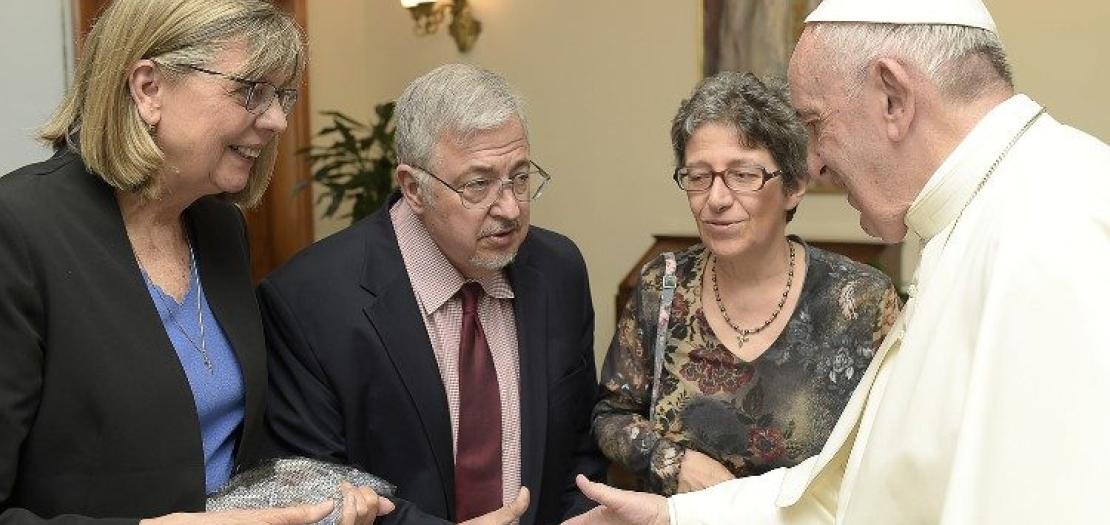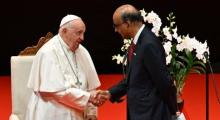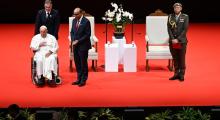Issued by the Catholic Center for Studies and Media - Jordan. Editor-in-chief Fr. Rif'at Bader - موقع أبونا abouna.org

Pope Francis met Dale Recinella (C) and his wife Susan (L) at Mass in the Casa Santa Marta on June 11, 2019
The Gospel is the encounter with a living Person who changes lives: Jesus is capable of revolutionizing our plans, our aspirations, and our perspectives. Knowing Him means filling our existence with meaning, because the Lord offers us a joy that never fades, for it is the very joy of God.
The story of Dale Recinella, whom I met during an audience, and have come to know better through the articles he has written over the years for L'Osservatore Romano and now through this deeply moving book, confirms what I have said: only in this way can we understand how a man, who had other goals in mind for his future, became the chaplain—as a lay Christian, husband, and father—to those condemned to death.
His is an extremely difficult, risky, and arduous task, because it touches evil in all its dimensions: the evil committed against the victims, which cannot be undone; the evil the condemned person is living through, knowing they are destined for certain death; the evil that, through the practice of the death penalty, is instilled in society. Yes, as I have repeatedly emphasized, the death penalty is in no way a solution to the violence that can strike innocent people. Capital executions, far from bringing justice, fuel a sense of revenge that becomes a dangerous poison for the body of our civil societies. States should focus on allowing prisoners the opportunity to truly change their lives, rather than investing money and resources in their execution, as if they were human beings no longer worthy of living and to be disposed of. In his novel The Idiot, Fyodor Dostoevsky succinctly encapsulates the logical and moral unsustainability of the death penalty, speaking of a man condemned to death: "It is a violation of the human soul, nothing more! It is written: 'Thou shalt not kill,' and yet, because he has killed, others kill him. No, it is something that should not exist." Indeed, the Jubilee should commit all believers to collectively call for the abolition of the death penalty, a practice that, as the Catechism of the Catholic Church states, "is inadmissible because it is an attack on the inviolability and dignity of the person!"
Moreover, Dale Racinella's work, not forgetting the significant contribution of his wife Susan as reflected in the book, is a great gift to the Church and society in the United States, where Dale lives and works. His commitment as a lay chaplain, particularly in such an inhumane place as death row, is a living and passionate testimony to the infinite mercy of God. As the Extraordinary Jubilee of Mercy taught us, we must never think that there could be a sin, a mistake, or an action of ours that distances us permanently from the Lord. His heart has already been crucified for us. And God can only forgive us.
Certainly, this infinite divine mercy can also be scandalous, as it scandalized many people in Jesus' time when the Son of God ate with sinners and prostitutes. Brother Dale also faces criticism, protests, and rejection for his spiritual commitment to the condemned. But is it not true that Jesus welcomed into His embrace a thief condemned to death? Well, Dale Racinella has truly understood and testifies with his life, every time he crosses the threshold of a prison, especially the one he calls "the house of death," that God's love is boundless and immeasurable. And that even the most heinous of our sins does not mar our identity in God's eyes: we remain His children, loved by Him, cared for by Him, and considered precious by Him.
Therefore, I would like to offer a sincere and heartfelt thank you to Dale Racinella: because his work as a chaplain on death row is a tenacious and passionate adherence to the deepest reality of the Gospel of Jesus, which is the mercy of God, His unconditional and steadfast love for every person, even those who have erred. And that from a loving gaze, like that of Christ on the cross, may they find a new meaning in their lives and, indeed, in their deaths.







